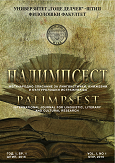ECOCRITICISM: EXPLORING THE NON-HUMAN WORLD IN AVRAMOVSKA’S NOVEL ВОДНИ ТЕЛА
DOI:
https://doi.org/10.46763/PALIM24918255mAbstract
This article explores how a small-scale utopia can be envisioned and constructed within a dystopian world affected by a gradual environmental catastrophe. The novel that depicts this dystopian setting is Водни тела (Water Bodies) by the Macedonian diasporic writer Ana Avramovska. The novel is focused on a woman coming back from Australia to her native town of Kumanovo, after many years abroad, to encounter how the town has changed as a result of the long-lasting effects of pollution. Searching for various unconventional ways to mitigate the pollution and find the sources of a river bank that has existed long ago, according to the grandmother’s stories, the narrator and her friends unconsciously search for their own beginnings. In line with previous research of ecofeminist fiction and dystopic perspectives, the novel explores and even insists on the possibility of enacting a utopian vision of a better world even in the middle of the environmental calamity. The main thesis explored in this research is that Water Bodies is an eco-critical novel, in accordance with Lawrence Buell’s criteria for evaluating a text as embodying environmental consciousness. All elements discussed in the article, such as the environmental problems, the importance of the nonhuman environment, and the search for an eco-utopia are arguments that support such thesis.
Keywords: ecocriticism; eco-utopia; ecofeminism; nonhuman; Avramovska; Водни тела.
Downloads
Downloads
Published
Issue
Section
License
The intellectual property and copyright on the original content of all scientific contributions in the published paper shall remain with the authors. Authors give permission to the JAPS owner to publish the paper. All authors agree to publish the paper under Attribution-NonCommercial-NoDerivatives 4.0 International license (CC BY-NC-ND 4.0)


